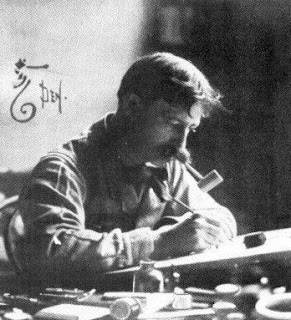William Wallace Denslow
Artist and Illustrator
William Wallace Denslow: professionally known as W. W.
Denslow, was an American illustrator and caricaturist remembered for his work
in collaboration with author L. Frank Baum, especially his illustrations of The Wonderful Wizard of Oz. Denslow was
an editorial cartoonist with a strong interest in politics, which has fueled
political interpretations of The Wonderful Wizard of Oz.
Born
May 5, 1856
Philadelphia, Pennsylvania, U.S.
Died
March 29, 1915 (aged 58)
New York City, New York, U.S.
Born in Philadelphia, Denslow spent brief periods at the National Academy of
Design and the Cooper Union in New York, but was largely self-educated and
self-trained. In the 1880s, he traveled about the United States as an artist
and newspaper reporter; he came to Chicago for the World's Columbian Exposition
in 1893, and chose to stay. Denslow acquired his earliest reputation as a
poster artist; he also designed books and bookplates, and was the first artist
invited to work at the Roycroft Press.
Denslow may have met Baum at the Chicago Press Club, where
both men were members. Besides The Wonderful Wizard of Oz, Denslow also
illustrated Baum's books By the
Candelabra's Glare, Father Goose: His Book, and Dot and Tot of Merryland. Baum and Denslow held the copyrights to
most of these works jointly.
After Denslow quarreled with Baum over royalty shares from the 1902 stage adaptation of The Wizard of Oz, for which Baum wrote the script and Denslow designed the sets and costumes, Baum determined not to work with him again. (As co-copyright-holder, Denslow demanded an equal share in royalties with Baum and composer Paul Tietjens.)
Denslow illustrated an edition of traditional nursery rhymes titled Denslow's Mother Goose (1901), along
with Denslow's Night Before Christmas (1902)
and the
18-volume Denslow's Picture Books series (1903–04).
He also used his copyright to the art of the Baum books to
create newspaper comic strips featuring Father Goose and the Scarecrow and Tin
Woodman during the first decade of the twentieth century.
The royalties from the print and stage versions of The Wizard of Oz were
sufficient to allow Denslow to purchase Bluck's Island, Bermuda, and crown
himself King Denslow I.
Denslow wrote and illustrated a children's book called The Pearl and the Pumpkin.
Denslow's illustration for "There was an Old
Woman Who Lived in a Shoe",
from a 1901 edition of Mother Goose.
Denslow had three
wives and three divorces in his lifetime. His first wife, Annie McCartney (née,
Anna M. Lowe, 1856-1908) married him in 1882 and gave birth to his only child,
a son, the following year. The couple were already separated, however, and
Denslow never saw his son. They finally divorced in 1896, freeing her to marry
the man she lived with for five months. That same day, February 20, 1896,
Denslow married Anne Holden Denslow, the daughter of Martha Holden, writer. The
marriage did not last long either. Anne filed for divorce in September 1903,
alleging that he told her in June 1901 that he did not love her and henceforth
declined to live with her. In less than a month she married a young artist, their
friend, Lawrence Mazzanovich, and left with him for Paris. Denslow then married
his third wife, Mrs. Frances G. Doolittle December 24. Frances left him in 1906
and they finally divorced in 1911. He changed his will in 1914, leaving his
estate to a fourth woman.













